| SHADOWS ON THE WALL | REVIEWS | NEWS | FESTIVAL | AWARDS | Q&A | ABOUT | TALKBACK | |||||
 Shadows off the beaten path Shadows off the beaten pathIndies, foreign, docs and shorts...
On this page:
APPLES |
QUO VADIS, AIDA? |
VERDICT
| |||||
| See also: SHADOWS FILM FESTIVAL | Last update 10.Mar.21 | |||||
|
Apples Review by Rich Cline | 
| |||||
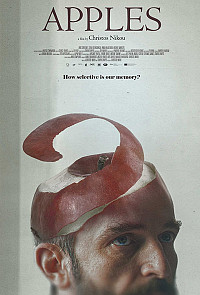 dir Christos Nikou scr Christos Nikou, Stavros Raptis prd Aris Dagios, Iraklis Mavroidis, Christos Nikou, Angelos Venetis, Mariusz Wlodarski with Aris Servetalis, Sofia Georgovassili, Anna Kalaitzidou, Argyris Bakirtzis, Kostas Laskos, Babis Makridis, Kimon Fioretos, Costas Xikominos, Alexandra Aidini, Nota Tserniafski, Electra Sarri, Natalie Chavez release US Oct.20 ciff, Gr Nov.20 tiff, UK 19.Mar.21 20/Greece 1h31 VENICE FILM FEST TORONTO FILM FEST Is it streaming? |
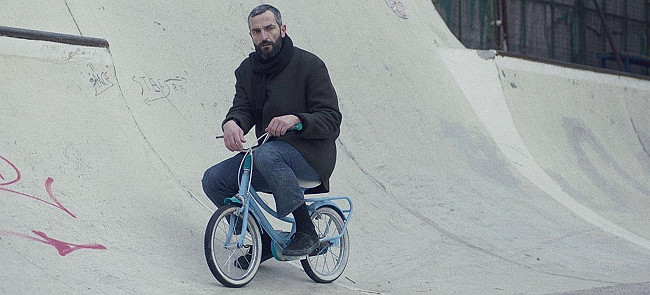 Sharply well-made, with understated performances, this absurdist Greek drama uses a lightly fantastical premise to explore how each of us fits into society. Seemingly set in an alternate version of the 1980s, the film is shot in a way that's both strikingly visual and effectively dull. Filmmaker Christos Nikou immediately pulls the audience into the story, forcing us to travel with the central character on an extraordinary journey. As a global pandemic inflicts sudden amnesia, 40-something Aris (Servetalis) loses all his memories while riding on a bus. Since he's carrying no identification, he's assigned the number 14843 and enrolled in the New Identity programme to build a life for himself. As an empty canvas, he will now need to create context and memories for himself. So he begins pursuing his skills and interests, gathering memories, meeting people, discovering that a dog is oddly fascinated with him and places feel familiar. Then he meets Anna (Georgovassili), a young woman in the same predicament. Aris knows nothing about himself other than that he loves apples. He has no fashion sense, content with the grey wardrobe provided for him. But little things catch his eye, and he has flickers of memory that he doesn't understand. Nikou offers witty visual gags and some blackly comical astute observations that play with the premise. And cinematographer Bartosz Swiniarski captures scenes in an unusual way that draws attention to expressions of humanity, deliberately refusing to look under the surface. Servetalis makes the blank Aris likeable, intrigued by things he sees around him, as well as things he might remember. But he's oddly asexual, even after being encouraged him to meet a woman. So when he does, he's only interested in snapping a Polaroid selfie for his teacher. Still, dancing comes naturally. Aside from his disconnected counsellors, Anna is the only other character, a fellow amnesiac who seems more open to this journey than Aris is. The training programme encourages Aris to discover various human experiences, including art, sport, socialising, sex, compassion and grief. So even if it's somewhat creepy and bleak, the film has an earthy soulfulness as it explores Aris' yearning to unlock the secrets of his own identity. It's fascinating to watch him find tiny slivers of himself. And it can't help but encourage us to think about how big the world would feel if we simply faced it as if we could be anyone we wanted to be.
| ||||
|
Quo Vadis, Aida? Review by Rich Cline |  MUST
MUST  SEE SEE
| |||||
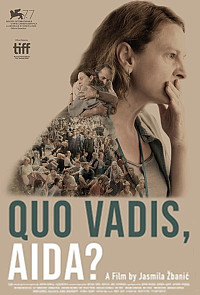 dir-scr Jasmila Zbanic prd Damir Ibrahimovich, Jasmila Zbanic with Jasna Djuricic, Izudin Bajrovic, Boris Ler, Dino Bajrovic, Johan Heldenbergh, Raymond Thiry, Boris Isakovic, Emir Hadzihafizbegovic, Reinout Bussemaker, Teun Luijkx, Juda Goslinga, Jelena Kordic Kuret release BiH 10.Oct.20, US 15.Mar.21 20/Bosnia 1h44 TORONTO FILM FEST Is it streaming? |
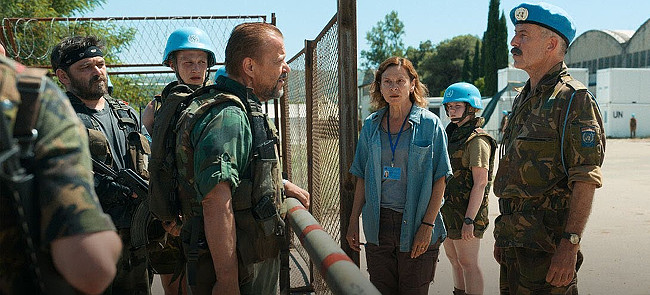 Based on true events surrounding a 1995 genocide in Bosnia, this astoundingly well-made drama is quick to remind audiences that these things happened within Europe. Writer-director Jasmila Zbanic takes an skilful approach that immediately gets under the skin, pulling us into the urgency of the situation. It's not an easy film to watch, especially with its depiction of how little the United Nations could do amid the unfolding tragedy. In the UN-designated "safe area" Srebrenica, locals know the world is ignoring the Serbian army's three-year onslaught. Aida (Djuricic) is a UN translator for officials who promise safety but can't protect the 30,000 residents. And when Serbians led by General Mladic (Isakovic) arrive, they mercilessly massacre civilians. Thousands flee to the UN encampment for shelter, including Aida's husband (Izudin Bajrovic) and sons (Ler and Dino Bajrovic), but most are trapped outside the gate. UN Colonel Karremans (Heldenbergh) knows he has no power or backup in his negotiations with Mladic, who already has a hideous plan. Scenes are staged on a staggering scale and shot expertly by cinematographer Christine Maier to capture both the vast crowds of desperate people and the intimate drama as Aida struggles to bridge a range of conversations. While following Aida on her specific journey, the film crosscuts between the refugees, the overwhelmed UN officials and the triumphantly brutal Serbs. Small events like childbirth and family reunions are contrasted against military violence and the horrors of international inaction. And there are colourful flashbacks to life before the nightmare. Each character is performed with an uncanny authenticity that roots everything in gritty, urgent reality. Djuricic is excellent in the central role, balancing Aida's churning internal thoughts and emotions as she faces a wide variety of situations. It's a gruelling performance, delivered with an understated honesty that heightens Aida's churning thoughts and feelings, balancing her job with attempts to save her family. And Isakovic is astonishing as the arrogant Mladic, knowingly controlling the situation and everyone around him. This is a staggering depiction of a recent historical event, assembled by the gifted Zbanic with an eye for the most humane details. As implications turn increasingly brutal, and the UN haplessly turns over the town's entire population to the Serbs, the tension becomes unbearable, especially for anyone who remembers history. Time and again over the centuries, people have stood by while the most evil atrocities were committed. This film is a cry for compassion in a world seems to be growing more callous by the day.
| ||||
|
Verdict Review by Rich Cline |  MUST
MUST  SEE SEE
| |||||
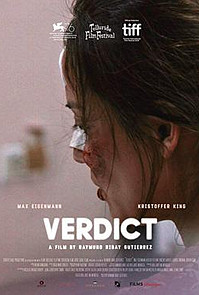 dir-scr Raymund Ribay Gutierrez prd Brillante Ma Mendoza with Max Eigenmann, Kristoffer King, Jorden Suan, Rene Durian, Lourdes Javelosa-Indunan, Vincent Aureus, Stephen Humiwat, Liza Schneider, Sidney Schneider, Dolly De Leon, Jalyn Perez, Dominic Carpio release US Aug.19 tff, Ph Sep.19 ppp, UK 12.Mar.21 19/Philippines 2h07 VENICE FILM FEST TORONTO FILM FEST Is it streaming? |
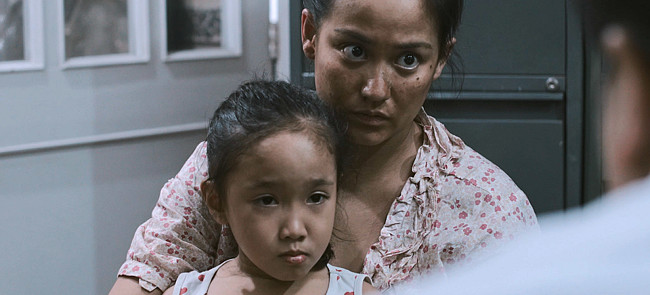 Shot in an urgent verite style, this gritty Filipino drama recounts a harrowing story with so much authenticity that events become bracingly visceral. It's a depiction of a broken justice system that echoes familiar headlines, from rough police tactics to out-of-balance courtrooms. Grounding convenient plot points with jarring realism, writer-director Raymund Ribay Gutierrez's fascinating forensic look at the legal process in the Philippines also highlights an urgent global issue. In Manila, Joy (Eigenmann) faces daily violence from her thuggish husband Dante (King), silently enduring this until he attacks their 6-year-old daughter Angel (Suan). Then she flees to the police and follows a labyrinthine process to press charges. With the help of a public prosecutor (Javelosa-Indunan), Joy wants the still-raging Dante out of their lives for good, worrying about the ongoing threat. Meanwhile, Dante's mother (De Leon) scrapes together the cash to pay his bail and hire a pricey lawyer (Aureus) before the case comes to trial before a male judge (Durian) and no jury. A compassionate domestic violence team responds quickly to the incident, with medical treatment and Dante's immediate arrest, but Joy is also presented with a hospital bill that's due before she can take Angel home. Joy's case is also complicated by a defensive injury she inflicted on Dante. Sequences play out in real time, as this broken family moves from the clinic to the police station to the prosecutor's office and a series of edgy meetings leading to skilfully written, directed and played courtroom scenes. The cast is unusually down-to-earth, with Eigenmann at the centre as a badly beaten woman who simply wants to protect her daughter. Her quiet tenacity is remarkable, and her bond with young Suan is hugely compelling. But she also beautifully plays Joy's deep doubts about the legal system. Opposite her, the late King boldly gives Dante an unrelentingly fierce presence. We've seen what he's capable of doing, but he's also an callous, arrogant liar. And each person around them has a powerful impact on their story. The propulsive filmmaking assures that there's never a dull moment in this story. Conversations have a desperate edge, while each event along the way comes with often heart-stopping implications. Without pushing a message, writer-director Gutierrez cleverly reveals how the entire culture is tilted against women, depicting underlying boys' clubs and women terrified to step forward and tell the truth. Bureaucracy adds to the sense that justice is out of reach. And it's horrifying that these same stories can be told in every culture on earth.
| ||||

See also: SHADOWS FILM FESTIVAL © 2021 by Rich Cline, Shadows
on the Wall
HOME | REVIEWS | NEWS | FESTIVAL | AWARDS
| Q&A | ABOUT | TALKBACK | | ||||


